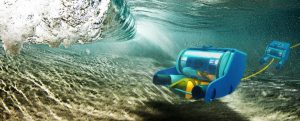Matheus Laranjeira (15 Jan. 2016 – 26 April 2019)
Supervision : Vincent HUGEL and Claire DUNE
Funding : PACA region grant and SUBSEA-TECH company

For energy autonomy purposes and to facilitate data transfer, remotely operated vehicles (ROV) are linked with an umbilical to a vessel. Big-sized ROV can be deployed to several hundreds of meter from their base but their working space forbids them to be deployed in shallow depth zones (< 7m). Conversely small modules can be deployed in shallow water but they can not manage a too much long tether that will disrupt them and make them impossible to manoeuver. Operations near the shore require the ship they are connected with to come close to the coast as well, which jeopardizes the stealth of the operation.
To solve this problem, we imagined a fleet of small ROVs linked to build a chain: several small similar modules are distributed all along the cable to compensate its movements, and allow the end module to behave as if it was in the vicinity of the base.
The objective of this thesis is to control the synchronized and coordinated navigation of a line of scout robots linked by an umbilical by using information issued from embedded sensors in a cooperative way (camera, sonar). Since the modules are linked by a cable, the displacement of one of them necessarily involves a perturbation for the others. In open-water systems, it comes to stabilize the tether. Near the shore, the control of the umbilical is required to face the ebb and flow, and if possible to face the perturbations caused by waves and vortices.
